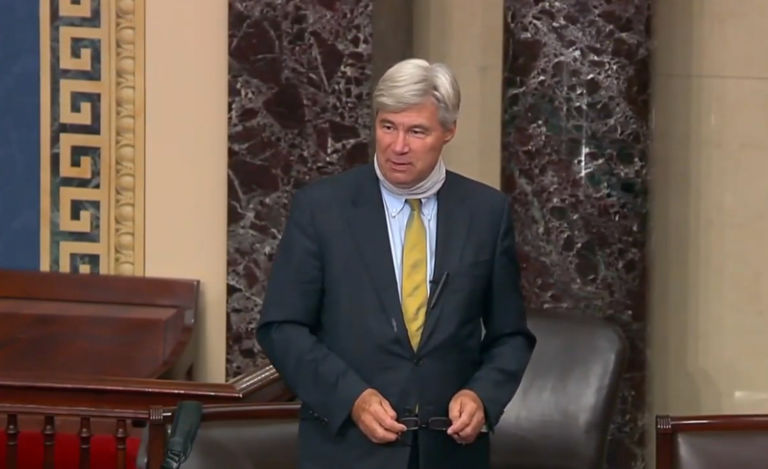Imagine this being an actual news story in the United States of America, land of the free:
Choice Grocery has moved a crucial step closer towards opening a store in Holly Springs. Residents tired of long drives to North Raleigh and Cary have been seeking a nearby grocer for over a decade.
The latest development came Tuesday when a state official upheld an earlier ruling that approved Choice’s application to locate a new grocery store in Holly Springs. The initial ruling was the first to document there is an officially "Certified Need" for a new grocer in that part of the state.
The ruling was hotly contested by grocery giant Ral-Mart, which complained that a new competitor would hurt its local monopoly and lead to lower prices and less profit. Ral-Mart has 30 days to contest the decision before the N.C. Court of Appeals.
That’d never happen, right? What business could it be of government’s to tell a prospective entrepreneur not to even bother, there’s no need for his service? He’s the risk-taker, after all. The decisions of investors and consumers would be the ones to provide the definitive answer to questions of need.
Furthermore, what if the poor, inconvenienced shoppers in far-flung areas would say yes to the new store if given the chance — except that the government, looking out for big business cronies, preemptively says no?
It sounds like something out of a Soviet farce. Unfortunately, it’s not too far removed from reality in North Carolina, one of the many states that still have Certificate-of-Need laws putting state officials in charge of restricting entry and expansion of, not food, but medical services. Here’s how the state Division of Health Service Regulation describes it:
The North Carolina Certificate of Need (CON) law prohibits health care providers from acquiring, replacing, or adding to their facilities and equipment, except in specified circumstances, without the prior approval of the Department of Health and Human Services. Prior approval is also required for the initiation of certain medical services. The law restricts unnecessary increases in health care costs and limits unnecessary health services and facilities based on geographic, demographic and economic considerations.
Given that health care providers are limited by the state, let us pause for the economically literate residents to choke past the notion of the state thinking it somehow reduces prices by deliberately preventing additional supply.
Now to proceed: clearly the laws offer no actual benefit for local residents. The elderly, the poor, people under time constraints (moms, small business owners, etc.), and — sheesh — especially people with emergency medical needs are better served by having medical services nearby. Who benefits from excluding them? Existing hospitals, like other big businesses with the ear of government, which are better served when they have a local monopoly (or oligopoly) and are protected from competition. As Dr. Roy Cordato found in his Policy Report "Certificate-of-Need Laws: It’s Time for Repeal," as recently as 2000 only 18 of the 100 counties in North Carolina had more than one hospital.
Going back to that not-so-hypothetical story above, here is the news today in The News & Observer:
Rex Healthcare has moved a crucial step closer towards constructing a 50-bed hospital in Holly Springs, which has been seeking a hospital of its own for more than a decade.
The latest development came Tuesday when a state official upheld an earlier ruling that approved the application submitted by the UNC Health Care-owned hospital system. The initial ruling was contested by archrival WakeMed and others. …
Holly Springs Mayor Dick Sears said he was greeted with "thunderous applause" when he announced the ruling by Drexdall Pratt, director of the state’s Division of Health Service Regulation, at a town council meeting Tuesday evening.
"I/we thought it was a very positive (development) in our long, long journey to get a hospital in Holly Springs," Sears said. Town residents, he added, "do not have quick access to a hospital."
Sears said he’s not a fan of a state regulatory system that limits the number of new hospital rooms that can be built each year, triggering fierce competition among hospital systems and seemingly endless appeals.
The article goes on to list other rulings. The state has magnanimously allowed WakeMed to add 51 hospital beds — after deciding the county didn’t "need" the other 50 hospital beds WakeMed had requested. The state has also approved Rex Healthcare’s application "to replace 115 acute-care beds with a new tower at its Raleigh campus dedicated to patients suffering from heart and vascular diseases." Nevertheless, the state also decided that people in or near Wakefield didn’t "need" a 40-bed hospital constructed there.
Click here for other recent examples of Certificate of Need affecting medical consumers across the state.
Click here for the Rights & Regulation Update archive.


